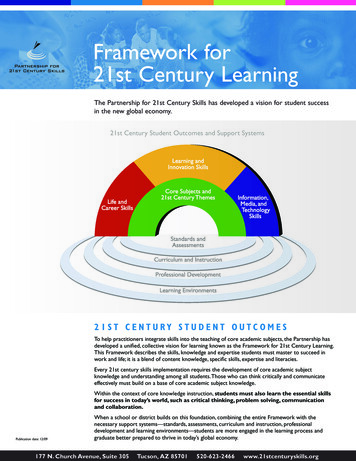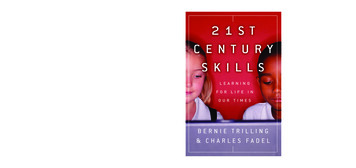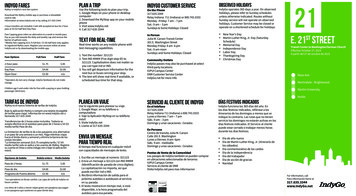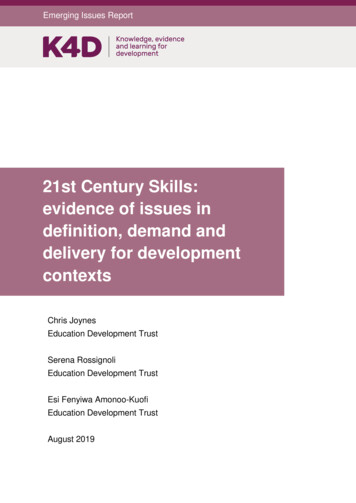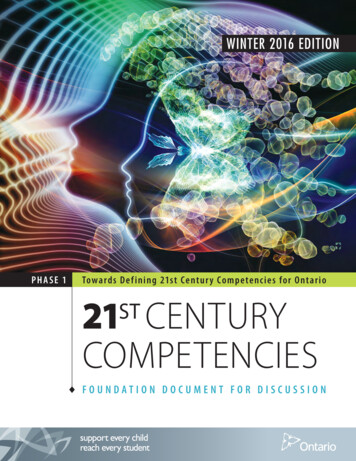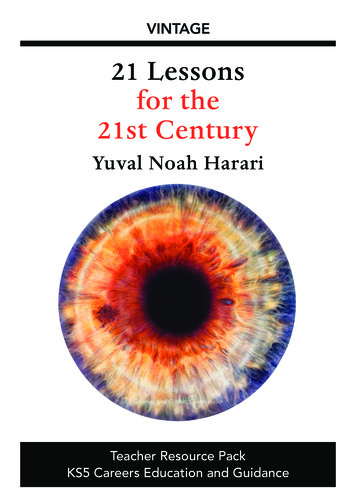
Transcription
21 Lessonsfor the21st CenturyYuval Noah HarariCourtesy and Marc Quinn studioTeacher Resource PackKS5 Careers Education and Guidance
Sapiens showed us where we came from.Homo Deus looked to the future.21 Lessons for the 21st Centuryexplores the present.HOW CAN WE PROTECT OURSELVES FROM NUCLEAR WAR,ECOLOGICAL CATACLYSMS AND TECHNOLOGICALDISRUPTIONS?WHAT CAN WE DO ABOUT THE EPIDEMIC OF FAKE NEWSOR THE THREAT OF TERRORISM?WHAT SHOULD WE TEACH OUR CHILDREN?Prof. Yuval Noah Harari has a PhD in History from the University ofOxford and now lectures at the Hebrew University of Jerusalem,specialising in world history. His first two books, Sapiens: A Brief History ofHumankind and Homo Deus: A Brief History of Tomorrow, have becomeglobal bestsellers, with more than 12 million copies sold, and translationsin more than 45 languages.21 Lessons for the 21st CenturyTeacher Resource Pack KS5 Careers Education and GuidanceCourtesy and Marc Quinn studioYuval Noah Harari takes us on a thrilling journey through today’s mosturgent issues. The golden thread running through his exhilaratingnew book is the challenge of maintaining our collective andindividual focus in the face of constant and disorienting change aswell as information overload. Are we still capable of understandingthe world we have created?2
Welcome to the KS5 teacher resourcepack for 21 Lessons for the 21st Centuryby Yuval Noah Harari.PURPOSE OF THE PACKThese activities are designed to help KS5 students consider theswiftly changing nature of the UK’s job market, and to evaluate whatskills and knowledge will best equip them for success in the future.The activities can be run as individual short sessions or as asingle 60-minute careers-focused lesson, depending on yourlesson structure, and should complement your school or college’sprogramme of integrated careers education and guidance.LEARNING OUTCOMESThe learning outcomes for the activities in this pack have beenidentified based on the documents Careers guidance: Guidancefor further education colleges and sixth form colleges (February2018) and CDI Framework for careers, employability and enterpriseeducation (March 2018)AREA OF LEARNINGBE ABLE TOSelf-awarenessAssess how you are changing and be ableto match your skills, interests and valuesto requirements and opportunities inlearning and work.Exploring careers and careerdevelopmentReflect on changing career processes andstructures and their possible effects onyour experience and management of yourown career development.Investigating work and working lifeDiscuss the personal, social, economicand environmental impacts of differentkinds of work and working life in thecontext of your own thinking about careersatisfaction.21 Lessons for the 21st CenturyTeacher Resource Pack KS5 Careers Education and Guidance3
Activity 1: Evergreen or out of date?INTRODUCTIONThe only thing that we can be completely sure of when consideringthe 21st century is change. This means that, in education or training,we are learning and developing skills that we hope will be relevantin the future – but are we learning the right things?THE ACTIVITYLook at the skill below, and arrange them into a diamond with the most useful at the top andthe least useful at the bottom. Be prepared to explain your reasoning, including what currentand future careers they might support.When deciding your order and reasoning, bear in mind: Is it something that could be doneaccurately by a computer or robot,without a human to oversee it? Is it linked more to creativeproblem-solving, or a methodicalstep-by-step process? Is it linked to an industry or careerin decline? Could it be used in a range ofjobs or situations?DEVELOPINGREUSABLEMATERIALSLEARNINGA UDIENCESFOR NEWPRODUCTSLEARNING TODISTINGUISHMEDIA BIASLEARNINGA MUSICALINSTRUMENTWRITINGCOMPUTERCODEREMEMBERING THELOCATIONSOF COUNTRIESUNDERSTANDINGHOW TO MANAGEFINANCESSUMMING UPWhat order did you decide on and why?How do these skills compare to what most young people in the UKare learning at school or in college?If you were to update our current curriculum what changes would yourecommend in order to give today’s teenagers the best opportunitiesin the 21st century?21 Lessons for the 21st CenturyTeacher Resource Pack KS5 Careers Education and Guidance4
Activity 2: Problems and solutionsINTRODUCTIONRecently, a section of Yuval Noah Harari’s new book, 21 Lessons forthe 21st Century, was published in Wired magazine, reproduced inthis pack. In the extract, divided into three sections –1. Change is the only constant2. The heat is on3. And hacking humans– Harari suggests that the best skill to teach young people isreinvention, and reveals what he believes 2050 has in storefor humankind.Credit: Britt Spencer21 Lessons for the 21st CenturyTeacher Resource Pack KS5 Careers Education and Guidance5
Activity 2: Problems and solutionsTHE ACTIVITYIn a small group read through the section that you have been allocated.Either as a large poster, or on a slide, prepare a short presentation to answer these questionsabout your section: What are Harari’s key arguments?What potential problems does heidentify, and what examples does hegive to illustrate them? As a group, do you agree with theproblems Harari picks out and thepossible solutions that he presents?Why do you agree or disagree? What solutions or advice does hesuggest to address these problems? What real-life examples from yourexperience can you give to support ordisapprove Harari’s argument? Arethere any additional solutions that youwould suggest?When creating your presentation, make sure: It will not take longer than five minutesto present to the other groups Everyone in the group contributes insome waySUMMING UPListen to each group’s presentation in turn.Which group do you feel presented the ideas from their section mostclearly?Are there any issues around skills, learning and the changing jobmarket of which you are now more aware?What questions do you still need to answer regarding your own skillsand the UK job market?21 Lessons for the 21st CenturyTeacher Resource Pack KS5 Careers Education and Guidance6
Yuval Noah Harari on what the year 2050has in store for humankindPART ONE: CHANGE IS THE ONLY CONSTANTHumankind is facing unprecedented revolutions,all our old stories are crumbling and no newstory has so far emerged to replace them. Howcan we prepare ourselves and our children for aworld of such unprecedented transformationsand radical uncertainties? A baby born today willbe thirty-something in 2050. If all goes well, thatbaby will still be around in 2100, and might evenbe an active citizen of the 22nd century. Whatshould we teach that baby that will help him orher survive and flourish in the world of 2050 orof the 22nd century? What kind of skills will heor she need in order to get a job, understandwhat is happening around them and navigate themaze of life?Unfortunately, since nobody knows how theworld will look in 2050 – not to mention 2100– we don’t know the answer to these questions.Of course, humans have never been able topredict the future with accuracy. But today it ismore difficult than ever before, because oncetechnology enables us to engineer bodies,brains and minds, we can no longer be certainabout anything – including things that previouslyseemed fixed and eternal.women, life expectancy would still be about 40,and the human body would be exactly the same.Hence in 1018, poor Chinese parents taughttheir children how to plant rice or weave silk,and wealthier parents taught their boys how toread the Confucian classics, write calligraphy orfight on horseback – and taught their girls to bemodest and obedient housewives. It was obviousthese skills would still be needed in 1050.In contrast, today we have no idea how Chinaor the rest of the world will look in 2050. Wedon’t know what people will do for a living,we don’t know how armies or bureaucracieswill function, and we don’t know what genderrelations will be like. Some people will probablylive much longer than today, and the humanbody itself might undergo an unprecedentedrevolution thanks to bioengineering and directbrain-computer interfaces. Much of what kidslearn today will likely be irrelevant by 2050.A thousand years ago, in 1018, there were manythings people didn’t know about the future, butthey were nevertheless convinced that the basicfeatures of human society were not going tochange. If you lived in China in 1018, you knewthat by 1050 the Song Empire might collapse,the Khitans might invade from the north, andplagues might kill millions. However, it wasclear to you that even in 1050 most peoplewould still work as farmers and weavers, rulerswould still rely on humans to staff their armiesand bureaucracies, men would still dominateCredit: Britt Spencer21 Lessons for the 21st CenturyTeacher Resource Pack KS5 Careers Education and Guidance7
Yuval Noah Harari on what the year 2050has in store for humankindPART ONE: CHANGE IS THE ONLY CONSTANTAt present, too many schools focus on cramminginformation. In the past this made sense, becauseinformation was scarce, and even the slow trickleof existing information was repeatedly blocked bycensorship. If you lived, say, in a small provincialtown in Mexico in 1800, it was difficult for youto know much about the wider world. Therewas no radio, television, daily newspapers orpublic libraries. Even if you were literate and hadaccess to a private library, there was not much toread other than novels and religious tracts. TheSpanish Empire heavily censored all texts printedlocally, and allowed only a dribble of vettedpublications to be imported from outside. Muchthe same was true if you lived in some provincialtown in Russia, India, Turkey or China. Whenmodern schools came along, teaching everychild to read and write and imparting the basicfacts of geography, history and biology, theyrepresented an immense improvement.In contrast, in the 21st century we are floodedby enormous amounts of information, and eventhe censors don’t try to block it. Instead, they arebusy spreading misinformation or distracting uswith irrelevancies. If you live in some provincialMexican town and you have a smartphone, youcan spend many lifetimes just reading Wikipedia,watching TED talks, and taking free onlinecourses. No government can hope to concealall the information it doesn’t like. On the otherhand, it is alarmingly easy to inundate the publicwith conflicting reports and red herrings. Peopleall over the world are but a click away from thelatest accounts of the bombardment of Aleppoor of melting ice caps in the Arctic, but there areso many contradictory accounts that it is hard toknow what to believe. Besides, countless otherthings are just a click away, making it difficult21 Lessons for the 21st CenturyTeacher Resource Pack KS5 Careers Education and Guidanceto focus, and when politics or science look toocomplicated it is tempting to switch to funny catvideos, celebrity gossip or porn.In such a world, the last thing a teacher needs togive her pupils is more information. They alreadyhave far too much of it. Instead, people need theability to make sense of information, to tell thedifference between what is important and whatis unimportant, and above all to combine manybits of information into a broad picture of theworld.In truth, this has been the ideal of western liberaleducation for centuries, but up till now evenmany western schools have been rather slackin fulfilling it. Teachers allowed themselves tofocus on shoving data while encouraging pupils‘to think for themselves’. Due to their fear ofauthoritarianism, liberal schools had a particularhorror of grand narratives. They assumed thatas long as we give students lots of data and amodicum of freedom, the students will createtheir own picture of the world, and even if thisgeneration fails to synthesise all the data intoa coherent and meaningful story of the world,there will be plenty of time to construct a goodsynthesis in the future. We have now run out oftime. The decisions we will take in the next fewdecades will shape the future of life itself, andwe can take these decisions based only on ourpresent world view. If this generation lacks acomprehensive view of the cosmos, the future oflife will be decided at random.8
Yuval Noah Harari on what the year 2050has in store for humankindPART TWO: THE HEAT IS ONBesides information, most schools alsofocus too much on providing pupils with aset of predetermined skills such as solvingdifferential equations, writing computer codein C , identifying chemicals in a test tube orconversing in Chinese. Yet since we have no ideahow the world and the job market will look in2050, we don’t really know what particular skillspeople will need. We might invest a lot of effortteaching kids how to write in C or how tospeak Chinese, only to discover that by 2050AI can code software far better than humans,and a new Google Translate app enables youto conduct a conversation in almost flawlessMandarin, Cantonese or Hakka, even thoughyou only know how to say ‘Ni hao’.So what should we be teaching? Manypedagogical experts argue that schools shouldswitch to teaching ‘the four Cs’ – critical thinking,communication, collaboration and creativity.More broadly, schools should downplay technicalskills and emphasise general-purpose life skills.Most important of all will be the ability to dealwith change, to learn new things and to preserveyour mental balance in unfamiliar situations. Inorder to keep up with the world of 2050, youwill need not merely to invent new ideas andproducts – you will above all need to reinventyourself again and again.In 1848, millions of people were losing their jobson village farms, and were going to the big citiesto work in factories. But upon reaching the bigcity, they were unlikely to change their gender orto add a sixth sense. And if they found a job insome textile factory, they could expect to remainin that profession for the rest of their workinglives.By 2048, people might have to cope withmigrations to cyberspace, with fluid genderidentities, and with new sensory experiencesgenerated by computer implants. If they find bothwork and meaning in designing up-to-the-minutefashions for a 3D virtual-reality game, within adecade not just this particular profession, butall jobs demanding this level of artistic creationmight be taken over by AI. So at 25, you introduceyourself on a dating site as ‘a twenty-five-yearold heterosexual woman who lives in Londonand works in a fashion shop.’ At 35, you say youare ‘a gender-non-specific person undergoingage-adjustment, whose neocortical activity takesplace mainly in the NewCosmos virtual world,and whose life mission is to go where no fashiondesigner has gone before’. At 45, both datingand self-definitions are so passé. You just wait foran algorithm to find (or create) the perfect matchfor you. As for drawing meaning from the art offashion design, you are so irrevocably outclassedby the algorithms, that looking at your crowningachievements from the previous decade fills youwith embarrassment rather than pride. And at 45,you still have many decades of radical changeahead of you.For as the pace of change increases, not just theeconomy, but the very meaning of ‘being human’is likely to mutate. In 1848, the CommunistManifesto declared that ‘all that is solid melts intoair’. Marx and Engels, however, were thinkingmainly about social and economic structures. By Please don’t take this scenario literally. Nobody2048, physical and cognitive structures will also can really predict the specific changes we willwitness. Any particular scenario is likely to bemelt into air, or into a cloud of data bits.21 Lessons for the 21st CenturyTeacher Resource Pack KS5 Careers Education and Guidance9
Yuval Noah Harari on what the year 2050has in store for humankindPART TWO: THE HEAT IS ONfar from the truth. If somebody describes to youthe world of the mid-21st century and it soundslike science fiction, it is probably false. But thenif somebody describes to you the world of themid-21st century and it doesn’t sound likescience fiction – it is certainly false. We cannot besure of the specifics, but change itself is the onlycertainty.world view, and built a stable identity. Even if at15 you spent most of your day working in thefamily’s rice field (rather than in a formal school),the most important thing you were doing waslearning: how to cultivate rice, how to conductnegotiations with the greedy rice merchants fromthe big city and how to resolve conflicts over landand water with the other villagers. In the secondpart of life you relied on your accumulated skills tonavigate the world, earn a living, and contributeto society. Of course, even at 50 you continuedto learn new things about rice, about merchantsand about conflicts, but these were just smalltweaks to well-honed abilities.By the middle of the 21st century, acceleratingchange plus longer lifespans will make thistraditional model obsolete. Life will come apartat the seams, and there will be less and lesscontinuity between different periods of life. ‘Whoam I?’ will be a more urgent and complicatedquestion than ever before.This is likely to involve immense levels of stress.For change is almost always stressful, and after acertain age most people just don’t like to change.When you are 15, your entire life is change. Yourbody is growing, your mind is developing, yourrelationships are deepening. Everything is in flux,and everything is new. You are busy inventingyourself. Most teenagers find it frightening, butat the same time, also exciting. New vistas areCredit: Britt Spenceropening before you, and you have an entireSuch profound change may well transform the world to conquer. By the time you are 50, youbasic structure of life, making discontinuity its don’t want change, and most people have givenmost salient feature. From time immemorial, up on conquering the world. Been there, donelife was divided into two complementary parts: that, got the T-shirt. You much prefer stability. Youa period of learning followed by a period of have invested so much in your skills, your career,working. In the first part of life you accumulated your identity and your world view that you don’tinformation, developed skills, constructed a21 Lessons for the 21st CenturyTeacher Resource Pack KS5 Careers Education and Guidance10
Yuval Noah Harari on what the year 2050has in store for humankindPART TWO: THE HEAT IS ONwant to start all over again. The harder you’veworked on building something, the more difficultit is to let go of it and make room for somethingnew. You might still cherish new experiences andminor adjustments, but most people in their fiftiesaren’t ready to overhaul the deep structures oftheir identity and personality.There are neurological reasons for this. Thoughthe adult brain is more flexible and volatile thanwas once thought, it is still less malleable thanthe teenage brain. Reconnecting neurons andrewiring synapses is damned hard work. But inthe 21st century, you can hardly afford stability.If you try to hold on to some stable identity, jobor world view, you risk being left behind as theworld flies by you with a whooooosh. Given thatlife expectancy is likely to increase, you mightsubsequently have to spend many decadesas a clueless fossil. To stay relevant – not justeconomically, but above all socially – you willneed the ability to constantly learn and to reinventyourself, certainly at a young age like 50.As strangeness becomes the new normal, yourpast experiences, as well as the past experiencesof the whole of humanity, will become less reliableguides. Humans as individuals and humankindas a whole will increasingly have to deal withthings nobody ever encountered before, such assuper-intelligent machines, engineered bodies,algorithms that can manipulate your emotionswith uncanny precision, rapid man-madeclimate cataclysms, and the need to changeyour profession every decade. What is the rightthing to do when confronting a completelyunprecedented situation? How should you actwhen you are flooded by enormous amounts ofinformation and there is absolutely no way you21 Lessons for the 21st CenturyTeacher Resource Pack KS5 Careers Education and Guidancecan absorb and analyse it all? How to live in aworld where profound uncertainty is not a bug,but a feature?To survive and flourish in such a world, you willneed a lot of mental flexibility and great reservesof emotional balance. You will have to repeatedlylet go of some of what you know best, and feel athome with the unknown. Unfortunately, teachingkids to embrace the unknown and to keep theirmental balance is far more difficult than teachingthem an equation in physics or the causes ofthe First World War. You cannot learn resilienceby reading a book or listening to a lecture. Theteachers themselves usually lack the mentalflexibility that the 21st century demands, for theythemselves are the product of the old educationalsystem.The Industrial Revolution has bequeathed usthe production-line theory of education. In themiddle of town there is a large concrete buildingdivided into many identical rooms, each roomequipped with rows of desks and chairs. At thesound of a bell, you go to one of these roomstogether with 30 other kids who were all bornthe same year as you. Every hour some grownup walks in and starts talking. They are all paidto do so by the government. One of them tellsyou about the shape of the Earth, another tellsyou about the human past, and a third tells youabout the human body. It is easy to laugh at thismodel, and almost everybody agrees that nomatter its past achievements, it is now bankrupt.But so far we haven’t created a viable alternative.Certainly not a scaleable alternative that can beimplemented in rural Mexico rather than just inupmarket California suburbs.11
Yuval Noah Harari on what the year 2050has in store for humankindPART THREE: HACKING HUMANSSo the best advice I could give a 15-year-oldstuck in an outdated school somewhere inMexico, India or Alabama is: don’t rely onthe adults too much. Most of them meanwell, but they just don’t understand theworld. In the past, it was a relatively safebet to follow the adults, because they knewthe world quite well, and the world changedslowly. But the 21st century is going tobe different. Due to the growing pace ofchange, you can never be certain whetherwhat the adults are telling you is timelesswisdom or outdated bias.control them? Should you rely on yourself, then?That sounds great on Sesame Street or in an oldfashioned Disney film, but in real life it doesn’twork so well. Even Disney is coming to realiseit. Just like Inside Out’s Riley Andersen, mostpeople hardly know themselves, and when theytry to ‘listen to themselves’ they easily becomeprey to external manipulations. The voice we hearinside our heads was never trustworthy, becauseit always reflected state propaganda, ideologicalbrainwashing and commercial advertisement,not to mention biochemical bugs.So on what can you rely instead? Technology?That’s an even riskier gamble. Technologycan help you a lot, but if technology gains toomuch power over your life, you might becomea hostage to its agenda. Thousands of yearsago, humans invented agriculture, but thistechnology enriched just a tiny elite, whileenslaving the majority of humans. Most peoplefound themselves working from sunrise tillsunset plucking weeds, carrying water bucketsand harvesting corn under a blazing sun. It canhappen to you too.Technology isn’t bad. If you know what you wantin life, technology can help you get it. But if youdon’t know what you want in life, it will be alltoo easy for technology to shape your aims foryou and take control of your life. Especially astechnology gets better at understanding humans,you might increasingly find yourself serving it,instead of it serving you. Have you seen thosezombies who roam the streets with their facesglued to their smartphones? Do you think theycontrol the technology, or does the technology21 Lessons for the 21st CenturyTeacher Resource Pack KS5 Careers Education and GuidanceCredit: Britt SpencerAs biotechnology and machine learning improve,it will become easier to manipulate people’sdeepest emotions and desires, and it willbecome more dangerous than ever to just followyour heart. When Coca-Cola, Amazon, Baidu orthe government knows how to pull the strings ofyour heart and press the buttons of your brain,could you still tell the difference between yourself and their marketing experts?12
Yuval Noah Harari on what the year 2050has in store for humankindPART THREE: HACKING HUMANSTo succeed in such a daunting task, you willneed to work very hard on getting to know youroperating system better. To know what you are,and what you want from life. This is, of course,the oldest advice in the book: know thyself. Forthousands of years, philosophers and prophetshave urged people to know themselves. But thisadvice was never more urgent than in the 21stcentury, because unlike in the days of Laozi orSocrates, now you have serious competition.Coca-Cola, Amazon, Baidu and the governmentare all racing to hack you. Not your smartphone,not your computer, and not your bank account –they are in a race to hack you, and your organicoperating system. You might have heard that weare living in the era of hacking computers, butthat’s hardly half the truth. In fact, we are living inthe era of hacking humans.Of course, you might be perfectly happy cedingall authority to the algorithms and trusting themto decide things for you and for the rest of theworld. If so, just relax and enjoy the ride. You don’tneed to do anything about it. The algorithms willtake care of everything. If, however, you want toretain some control of your personal existenceand of the future of life, you have to run fasterthan the algorithms, faster than Amazon and thegovernment, and get to know yourself beforethey do. To run fast, don’t take much luggagewith you. Leave all your illusions behind. Theyare very heavy.The algorithms are watching you right now. Theyare watching where you go, what you buy, whoyou meet. Soon they will monitor all your steps,all your breaths, all your heartbeats. They arerelying on Big Data and machine learning toget to know you better and better. And oncethese algorithms know you better than you knowyourself, they could control and manipulate you,and you won’t be able to do much about it. Youwill live in the matrix, or in The Truman Show.In the end, it’s a simple empirical matter: if thealgorithms indeed understand what’s happeningwithin you better than you understand it,authority will shift to them.21 Lessons for the 21st CenturyTeacher Resource Pack KS5 Careers Education and Guidance13
Activity 3: Your career in the 21st centuryINTRODUCTIONThe UK job market has changed rapidly over the last 10 – 15 years.Some major changes include: Growth of the ‘gig economy’ – multiplepeople working for a large company asself-employed freelancers rather thanas employees (e.g. Uber, Deliveroo) Rise of the idea of the ‘side-hustle’,an additional income stream overevenings or weekends, alongside amain full-time job Decrease in ‘careers for life’ – morepeople switch between industriesrather than working for a singlecompany/organisation Some high-profile companies areremoving the requirement for degree-level qualifications, in favour of focuson relevant skills and experience Fewer people attracted to publicsector jobs e.g. nursing, teaching, dueto concerns about pay and conditions An increasing number of manuallow-skill and manufacturing jobs arebecoming automated and are nowcarried out by robots Increase in jobs based in media, digital,entertainment and finance21 Lessons for the 21st CenturyTeacher Resource Pack KS5 Careers Education and Guidance14
Activity 3: Your career in the 21st centuryTHE ACTIVITYBased on what you’ve learned about the changing job market in theUK, and the increasing importance of transferable skills, create a newversion of your CV, with the following categories: Name, contact details Relevant skills and experience:List these with the most recentexperience first, including workexperience, internships and any parttime jobs, as well as any extracurricularactivities e.g. volunteering with acharity, running a blog or YouTubechannel. Include 2–3 sentences toexplain what skills or pieces of relevantknowledge you gained Interests: Include three interestsoutside college or work experience,including 1–2 sentences to explainwhat skills or relevant knowledge yougained from them Qualifications: Include any exam resultsso far, plus any vocational qualificationsor qualifications gained through yourextracurricular activities or interestsYou CV should take up no more than two A4 sides, font size 12,so make sure that anything you include is relevant, concise anddemonstrates a range of skills that you can offer.SUMMING UPPair up and swap your CVs. Colour-code your partner’s CV to show: Areas which made them appear skilled or knowledgeableabout a particular field Areas which could be improvedBe ready to give specific feedback about what impressed you mostand why, and how improvements could be made e.g. clarity ofwording, specific examples, more detail.21 Lessons for the 21st CenturyTeacher Resource Pack KS5 Careers Education and Guidance15
Extension tasksINTRODUCTIONYou have considered the challenges of rapid technological changeand automation, and their effects on the UK job market, but thesechanges are also happening worldwide, including in developingcountries. For some people, these changes could result in a muchbetter quality of life, but for others they may mean the disappearanceof jobs and income. How would the changing job market look tosomeone in India, or Brazil?THE ACTIVITYIn a small group, discuss the following questions: Do
Recently, a section of Yuval Noah Harari’s new book, 21 Lessons for the 21st Century, was published in Wired magazine, reproduced in this pack. In the extract, divided into three sections – 1. Change is the only constant 2. The heat is on 3. And hacking humans – Harari







